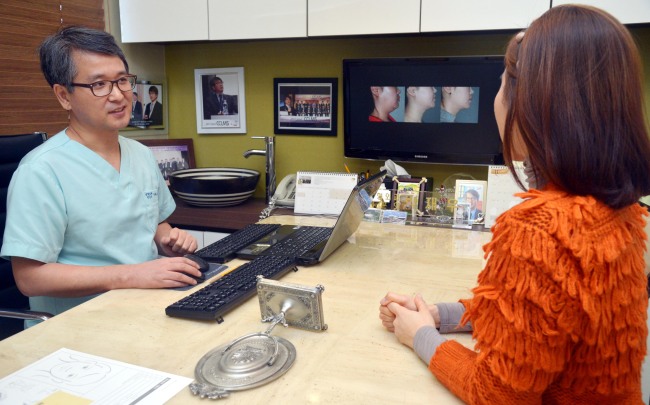A Chinese woman entered Dr. Park Plastic Surgery in the “beauty Mecca” of Gangnam, known for its cluster of plastic surgery clinics, as the first patient on a Friday morning. She and her two friends were greeted by a Chinese staff interpreter in the lobby.
An hour later, a second set of patients ― a father and a daughter from Kazakhstan ― came in, and were escorted by a staff interpreter who speaks Russian to examination rooms for a checkup.
On one side of the wall in the lobby hang four plastic boards on which the curriculum vitae of the clinic’s doctor is written in Chinese, Japanese, Russian and Mongolian ― the four major foreign languages of patients who frequent the clinic.
“Thirty percent of the patients at the clinic are foreigners, coming from China, Japan, Russia, Mongolia, Kazakhstan and Kyrgyzstan,” said Park Jae-woo, a doctor at the clinic, in an interview with The Korea Herald.
More foreigners fly to Korea to enhance their looks every year. Their numbers have been growing, with an average annual rate of increase of 75.6 percent from 2009 to 2012, the highest among medical specialties, according to the Korea Health Industry Development Institute’s data on foreign patients. The number of plastic surgery patients showed a dramatic jump from 2,851 in 2009 to 15,428 in 2012.
“Korean cosmetic surgery is among the best in the world … Many wealthy people are coming to Korea for cosmetic procedures and other people with average incomes are hoping they’ll be able to visit the country for cosmetic surgery in the future,” said the Chinese woman at Dr. Park Plastic Surgery through a Chinese interpreter. She wished to remain anonymous.
According to the Chinese interpreter, most of the patients at the clinic are high-profile people in their country, including congressmen, high ranking government officials and CEOs.
Doctors said that several factors that attract them to the Far Eastern country is the improved national image of Korea, combined with the immaculate appearances of Korean celebrities on dramas.
“They want a sort of likeness (to Korean stars),” said Park.
But patients say it was personal recommendations from their friends and relatives that led them to come.
“My aunt had plastic surgery here, as well as my aunt’s friends and her friends too. Their recommendations helped me choose this clinic,” said Gulsum Muratbay, a 32-year-old female patient from Kazakhstan, who’s staying in Seoul for 17 days for multiple procedures.
Word of mouth and information provided by clinics are becoming two major information sources for foreign patients.
“In the past, many patients had plastic surgery at hospitals they were introduced to through brokers or agencies. They didn’t have a choice when it came to finding the clinic that was best for them. Now, as clinics begin to offer information online and online consultation, more foreigners browse information online and talk to former patients before they make decisions,” said an official of ID Plastic Surgery Hospital in Gangnam, who wished to remain anonymous.
Some brokers without legal licenses have often caused problems, asking for large commission fees, forcing plastic surgeons to overcharge foreign patients up to seven times more than usual or recommending unnecessary procedures. A few failed cases caused by illegal brokers have been reported in the Chinese media.
As foreign patients are becoming more active in their choice of clinics, they include some travel preferences in their itineraries. According to the Korea Tourism Organization, 56.9 percent of tourists here on medical tourism went shopping or visited famous tourist spots in Korea during their surgery travels.
The Chinese patient at Dr. Park’s clinic also said she planned to go shopping and sightseeing while she stayed in Dongdaemun, one of the popular shopping areas in Seoul for foreigners, for 10-days.
The Korean tourism industry is stepping up to cater to the needs of these visiting patients. Major hotels in Seoul are teaming up with cosmetic surgery clinics and hospitals in offering accommodation and a diverse range of travel services.
The Ritz-Carlton Seoul is among those arranging accommodation for foreign patients coming to visit nearby cosmetic surgery clinics in Gangnam. The hotel is also one of the few five-star hotels in Korea that has an in-house plastic surgery clinic.
Last year, it launched an $88,000 “anti-aging package” that included a medical checkup, stem cell treatment, plastic surgery, skin care and spa treatment as well as access to the hotel’s restaurants. The package was popular among Chinese tourists.
“The hotel has staff who are assigned to take care of Chinese guests here on medical tourism. We also plan to offer customized service such as one-on-one interpretation and shopping guides for major department stores in Seoul during their stay,” said a hotel staff member.
By Lee Woo-young (
wylee@heraldcorp.com)





![[Exclusive] Hyundai Mobis eyes closer ties with BYD](http://res.heraldm.com/phpwas/restmb_idxmake.php?idx=644&simg=/content/image/2024/11/25/20241125050044_0.jpg)
![[Herald Review] 'Gangnam B-Side' combines social realism with masterful suspense, performance](http://res.heraldm.com/phpwas/restmb_idxmake.php?idx=644&simg=/content/image/2024/11/25/20241125050072_0.jpg)

